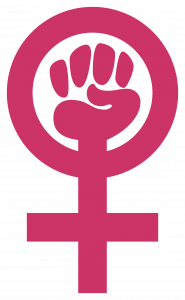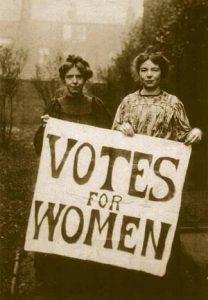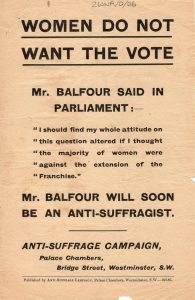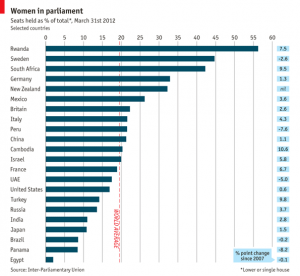
In this blog I am going to be talking about the clear inequalities between men and woman within the political system. As we live in a patriarchal society with major inequalities between the sexes it is not surprising that men get paid more than women and that woman are more at risk to rape and domestic violence. Despite this only being a couple examples from a very long list, it is apparent that there is still a strong bias towards men.
You may argue that there are more equal opportunities for the sexes today but there is still solid opposing evidence. My main aim of this blog is to demonstrate how woman are underrepresented in politics, how the suffrage movement helped encourage change in politics and also why there has been a decline in women voting in recent years.
When looking at gender in politics it is impossible not to mention the suffrage movement and how they fought for the right for woman to be able to vote. Before this movement, women around the world were not allowed to vote in parliamentary elections meaning that only men could express their political views and potentially change their government. This was because men and women were seen as opposites which would cause competition between the sexes. In 1866 women submitted their first petition to parliament asking for votes for women when no such progress began on the topic the National Union of Women’s Suffering Societies came about gaining 50,000+ members across the country within 18 years. Although they had gained popularity still nothing was being done about the vote leaving the women with no choice but to act violently in the hope that their views would be heard. The ‘deeds not words’ actions involved aggressive campaigning which lead to 1000 women being arrested (Hunter,2018). Emily Wilding Davidson became the martyr of the cause when she threw herself under the king’s horse. This lead to her death 4 days after but did grant all women the right to vote. Without this movement women may still not be able to vote meaning that politics would be run by only men belittling women across the world. This movement gave women the right to vote and was one of the first major advances in equality between the sexes.
However, the suffrage movement were opposed by the National Association who even made leaflets which stated facts why women should not be allowed to vote. One of the reasons listed was “because it is unwise to risk the good we already have for the evil which may occur” (Verma, 2018) suggesting that women are incapable of making the right choice? This statement shows just how patriarchal society was and how women were not trusted to vote because it could cause more problems for men if they do.
You may think that because of all the conflict that occurred when women were unable to vote that the majority of women would vote today? WRONG! it’s been over 100 years since the suffrage movement and women votes since 1992 till 2012 have fallen by 18% (Cohen 2015) showing that less woman are engaging in politics than they were a couple decades ago. The decline in votes unfortunately supports the idea that women are underrepresented in politics. In figure 1 we notice that in some countries such as Rwanda where over 55% of their government is made up of women showing that women can be the majority and do have an interest for politics. This graph made me realise that just because women in politics may be underrepresented in England it doesn’t mean women are in all countries proving that equal opportunities for women are possible.
Women are still underrepresented in politics when it comes to parliament and voting. In 2015, 191 MP’s were elected into parliament showing a rise in women MP’s (figure 2). However, this still means that only 29% of MP’s in Britain are female and 71% are male, showing a clear inequity between men and women (PSA, 2018). The rise of women MP’s is a positive change but it is still disappointing how men are largely in charge of politics. In England today, Theresa May is our current prime minister emphasising women’s power in politics. But I can’t help but wonder whether Theresa May would have been voted in if there was an election when David Cameron stood down. The clear favouritism towards men in politics makes me think that she may not have been.
In conclusion, patriarchy is present in today’s society and especially in politics with only around 30% of MP’s being women in the UK. In other countries there is a clear difference when it comes to politics and gender inequality as places like Rwanda do have a majority of women running the government. I think it is clear that the suffrage movement was vital and did allow oppressed women the right to express their own views by voting. It is a shame that women recently have declined in voting when the suffragettes campaigned for years and years to secure this vote. To get women to vote we need to encourage them through the education system to ensure a fairer democracy.
References:
Cohen, C., 2015. Almost 100 years on from winning the vote, women shun the polling booths [WWW Document]. URL http://www.telegraph.co.uk/women/womens-politics/11333915/British-women-general-election-voters-shun-the-polling-booths.html [Accessed 20 Apr. 2018]
Hunter, L. (2018). ‘Deeds not words’ was rallying cry of brave suffragettes – Sunday Post. [online] Sunday Post. Available at: https://www.sundaypost.com/fp/deeds-not-words-was-rallying-cry-of-brave-suffragettes/ [Accessed 22 Apr. 2018].
Verma, S. (2018). Why weren’t women allowed to vote earlier?. [online] Available at: https://www.quora.com/Why-werent-women-allowed-to-vote-earlier [Accessed 21 Apr. 2018].
Why Aren’t There More Women in British Politics? | The Political Studies Association (PSA). (2018). [online] Available at: https://www.psa.ac.uk/insight-plus/why-arent-there-more-women-british-politics [Accessed 20 Apr. 2018].





Be the first to comment